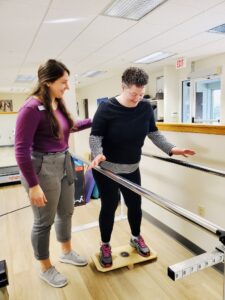Written by Greta Myers, DPT, NCS, CSRS, PWR! Moves Therapy & Certified Stroke Rehab Specialist
Article
Exercise, Health & Wellness, Multiple Sclerosis, Physical Therapy
A study funded by the National MS Society has confirmed that nearly one million people are living with MS in the United States. Multiple Sclerosis can affect people differently including fatigue, walking, balance, tightness, and weakness. Since March is Multiple Sclerosis Awareness Month let’s learn about how Physical therapy can help with each of these symptoms.
 Exercises:
Exercises:
There are many different types of exercises that physical therapists can use to help you reach your goals.
We choose these exercises or treatments based on the specific activities that you want to be able to do again. The National MS Society recommends people with MS exercise for at least 150 minutes of exercise per week.
Some general exercise recommendations include:
- Cardio/aerobic training including walking, biking, or water aerobics
- Strength training can use weights or resistance bands to strengthen your upper body, lower body, and core.
- Neuromotor exercises focus on quality of movement to help with coordination and controlling movement. This is a more complicated type of exercise that depends on analyzing movements to adapt them. Some examples include hand-eye coordination, balance, and agility.
- Flexibility involves static and dynamic stretches (including yoga) to help increase your movement and decrease feelings of tightness.
However, everyone has different symptoms and different goals. This is why it is important to partner with a physical therapist to help individualize these exercises and reach your specific goals.
Fatigue:
Most people with Multiple Sclerosis report fatigue. Appropriate exercise can reduce fatigue and improve your function. PT’s have the skills to help manage exercise for people with MS safely. While improving these symptoms, physical therapists can help educate you on how to manage your fatigue and help manage heat sensitivity especially during exercise. One suggestion for combatting fatigue is using short, more intense bouts of exercise and then rest periods can allow you to decrease your levels of fatigue while still exercising at an intense level.
Adaptive Equipment:
In addition to helping manage the symptoms of MS, physical therapists can help identify appropriate equipment to help ease movement. Equipment such as walking aides like canes or a walker can make you more steady. Other equipment can include braces to help clear your feet, and depending on your functional level, physical therapists can even help you acquire a wheelchair or scooter.
Relapses:
Relapses or flare-ups can happen with MS, but once they are over, it is important to return to physical therapy as soon as possible so you can regain as much function as possible after the flare-up.
Using a customized exercise program your PT will work on strength, endurance, balance, smooth movements, and preventing muscle tightness to help you regain your function.
Wellness Cycle:
MS is an evolving and progressive disease; partnering with a physical therapist throughout your journey can help manage life and disease changes as they occur. It is recommended that you have annual reassessments from your PT to monitor physical changes, identify new concerns, and adapt a wellness program for your specific needs. A partnered approach between physical therapy and wellness has been shown to dramatically improve the health and wellness of people with neurological conditions.
Furthermore, Medicare has established coverage for a Maintenance Therapy Program. With this program, Medicare will cover physical therapy that helps you maintain your current abilities as long as the therapy is skilled and medically necessary to prevent a decline in condition.
As a neurological physical therapist, I have a passion for working with people with neurological diseases to help them live their best life. If you have any questions or want help getting started feel free to email me at gmyers@hartzpt.com or call me for a FREE phone consultation at 717.735.8880.
*You should always contact your physician prior to starting any exercise program*
MS symptoms. National Multiple Sclerosis Society. (n.d.). Retrieved March 20, 2023, from https://www.nationalmssociety.org/Symptoms-Diagnosis/MS-Symptoms
Multiple sclerosis and exercise – neuropt.org. (n.d.). Retrieved March 20, 2023, from https://neuropt.org/docs/default-source/default-document-library/ms-and-exercise
Rafferty MR, Held Bradford EC, Fritz S, et al. Health Promotion and Wellness in Neurologic Physical Therapy: Strategies to Advance Practice. Journal of Neurologic Physical Therapy. 2021;46(2):103-117. doi:10.1097/npt.0000000000000376
